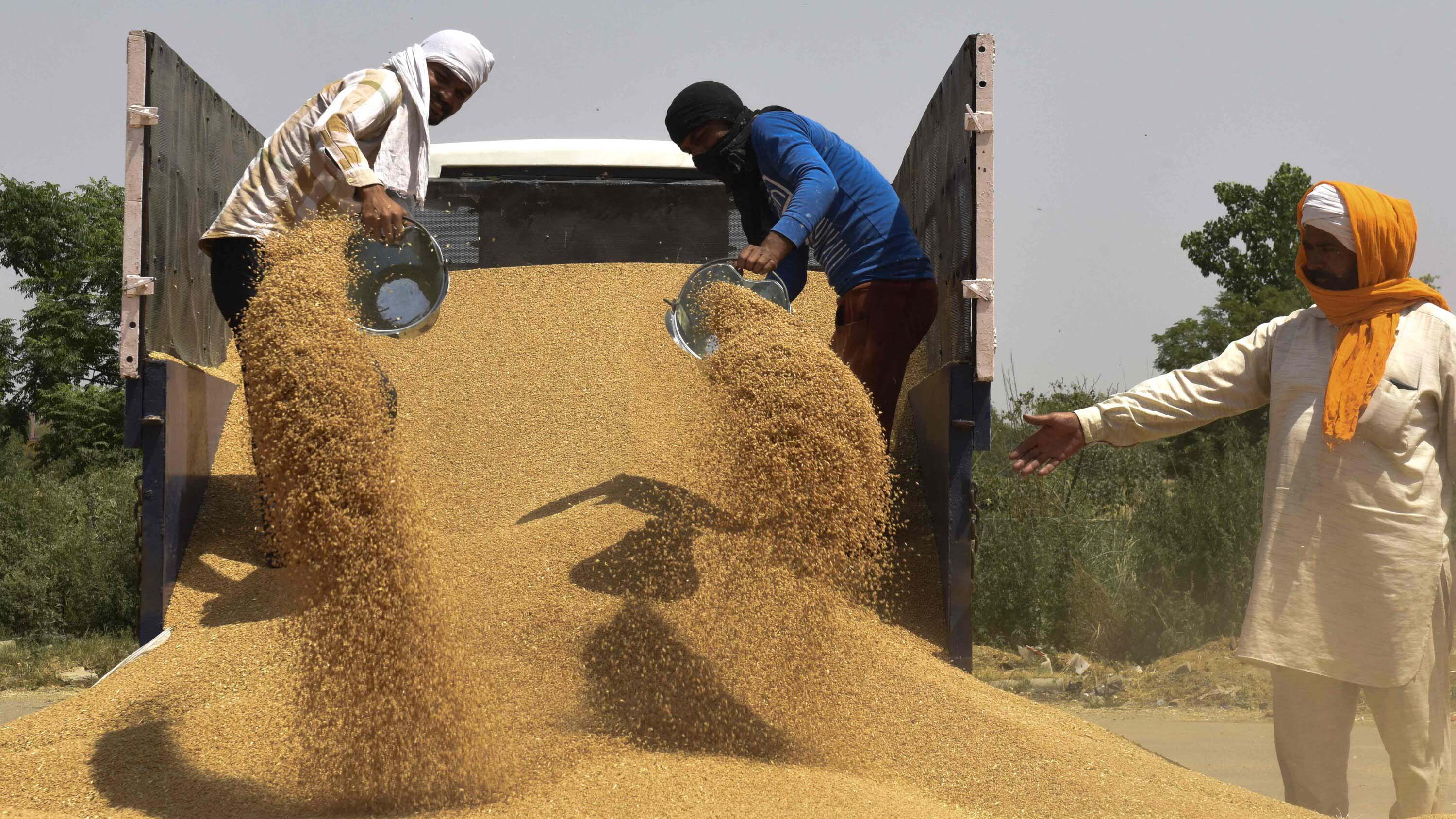
India is being asked by the US and the IMF to reconsider its decision to suspend wheat exports. But their cited concern that export curbs will exacerbate food shortages does not hold water
India is being asked by the United States and the International Monetary Fund to reconsider its decision to suspend wheat exports. The data studied reveals that not India but the US itself is to be blamed for the impending food crisis.
Cereals are meant to be consumed by humans but the US government-funded ethanol industry uses an equivalent of 35 percent of the global world trade of cereals of 473 million tonnes. The Indian export ban set to prevent hunger will affect less than 2 percent of this amount.
The real culprit is use of food for animal feed as well as for other non-food uses, mainly agro-fuels. Ironically, India is being asked by the US government and the International Monetary Fund to reconsider its decision to suspend wheat exports. Their cited concern is that export restrictions will exacerbate food shortages amidst Russia’s invasion of Ukraine. But the argument does not stand ground technically or morally.
Santosh Kumar Sarangi, Director General, Foreign Trade, disclosed that “there is a sudden spike globally in the prices of wheat as a result of which the food security of India and neighbouring vulnerable countries is at risk. As a result, the government had made some amendments in its export policy.”
However, the government announced some relaxation to its order dated 13th May issued by Directorate General of Foreign Trade (DGFT), Department of Commerce, on restricting wheat exports. It has been decided that wherever wheat consignments have been handed over to Customs for examination and have been registered into their systems on or prior to May 13, such consignments would be allowed to be exported.
The government also allowed a wheat shipment headed for Egypt, which was already under loading at the Kandla port. This followed a request by the Egyptian government to permit the wheat cargo being loaded at the Kandla port. Meera International India, the company engaged for export of the wheat to Egypt, had also given a representation for completion of loading of 61,500 MT of wheat of which 44,340 MT of wheat had already been loaded and only 17,160 MT was left to be loaded. The government decided to permit the full consignment of 61,500 MT and allowed it to sail from Kandla to Egypt.
The government had earlier restricted wheat exports to manage the overall food security situation in India and to support the needs of neighbouring and vulnerable countries that are adversely affected by the sudden changes in the global market for wheat and are unable to access adequate wheat supplies. According to this order, this restriction would not apply in cases where prior commitments have been made by private trade through Letter of Credit as well as in situations where permission is granted by the Government of India to other countries to meet their food security needs and on the requests of their governments.
The order served three main purposes: ensure India’s food security and check inflation, it helps other countries facing food deficit, and it maintains India’s reliability as a supplier. The order also aimed to provide a clear direction to the wheat market to prevent hoarding of wheat supplies.
Interestingly Frederic Mousseau, Policy Director at The Oakland Institute, San Francisco, quoting a May 6, 2022 report by the United Nations Food and Agriculture Organization (FAO), observed that the world enjoys “a relatively comfortable supply level” of cereals. This is also confirmed by the World Bank which noted that global stocks of cereals are at historically high levels and that about three-quarters of Russian and Ukrainian wheat exports had already been delivered before the war started. All this means that actually there is no food shortage. These numbers are consistent with data from the Ukrainian Ministry of Agriculture that reported on May 19 that the country exported 46.51 million tons of cereals in the 2021/22 season, versus 40.85 million the previous year.
Also food crisis could be due to speculation because speculators flood the commodity markets in attempts to make a profit out of escalating prices. A striking example are two top commodity-linked “exchange traded funds” (ETFs) which have received US$1.2 billion of investments – compared to just US$197 million for the whole of 2021 – a 600 percent increase. Reports point out that in April, speculators were responsible for 72 per cent of the buying activity on the Paris wheat market, up from 25 percent before the pandemic just to bet on hunger to make money out of self-created shortage.
Instead of food shortage, the reality is that the world produces far more food than we eat. Over 33 percent of the food produced globally is used for animal feed as well as for other non-food uses, mainly agro-fuels. Over 40 per cent of the roughly 400 million tons of corn – 160 million tons – goes to ethanol production. Another 40 per cent goes to animal feed. Only 10 per cent is used as food whereas another 10 per cent is exported. India was not expected to export more than 10 million tons of wheat in 2022-2023, which is insignificant in comparison to the US numbers. Indeed the increasing amount of food diverted to the production of agro-fuels –is a major factor fuelling tension in the global cereal markets.
In the US, ethanol production had increased from 3.6 million barrels in 2001 to over 102 million barrels by now. This is despite the fact that ethanol is at least 24 percent more carbon intensive than gasoline. This is nothing short of hypocrisy and the World Bank, the International Monetary Fund, the World Food Programme, and the World Trade Organization, are urging “all countries to keep trade open and avoid restrictive measures such as export bans on food or fertilizer that further exacerbate the suffering of the most vulnerable people.”
But if governments and international institutions are serious about eliminating human suffering caused by high food prices, they should abstain from pressuring countries who are trying to maintain food supply at a level which will allow national food security. It is essential that they recognize and respect the food sovereignty of all nations.
Immediate key measures that countries should be taking to relieve pressure on world markets are to reduce the amount of food used as fuel, curb speculation on food products – specifically restricting the so-called future commodity markets where speculators bet on future prices. The only reasonable decision would be for them to act decisively on the broader causes of the high food prices and curb speculation on food commodities and diversion of food for the production of fuel.
On its part, India has been successful in preventing price transmission to domestic markets through trade regulation measures and by supporting its farmers by regulating markets. India’s achievement comes at a time when it has achieved 10% ethnol blending of petrol five months ahead of schedule. Prime Minister Narendra Modi during his address to a ‘Save Soil’ programme organised by the Isha Foundation run by spiritual leader Sadhguru to mark World Environment Day on June 6 himself confirmed that the achievement has reduced carbon emission by 27 lakh tonne, saved the country Rs 41,000 crore in foreign exchange spending (on oil imports) and boosted income of farmers by Rs 40,000 crore in eight years.













